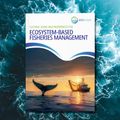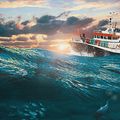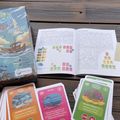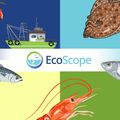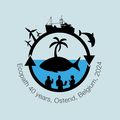EcoScope partner calls for making marine ecosystem modelling more accessible to society, policy and the collaboration with other sciences
Jeroen Steenbeek of EU-funded EcoScope project partner Ecopath International Initiative has published his PhD thesis, entitled Ecosystem modelling for the ocean decade – facing the challenge (Cum Laude).
“My thesis explores how simple, practical solutions can unlock the full societal potential of marine ecosystem models (MEMs). These models are invaluable tools for understanding and managing our oceans, yet they often fall short of their potential due to overlooked technical barriers,” commented Steenbeek. “In my work, I emphasise the importance of robust infrastructure—the ‘plumbing and piping’—beneath the science. By addressing these foundational aspects, we can make MEMs more accessible, reliable, and impactful for policymaking and ecosystem-based management,” he added.
Steenbeek did his thesis at the Universitat Politècnica de Catalunya’s Department of Civil and Environmental Engineering under the guidance of Villy Christensen, Elizabeth A. Fulton and Manuel Espino Infantes, and recognised EcoScope funding in his research.
“Twenty years ago, through a number of chance opportunities and spontaneous decisions, I rolled into marine ecosystem modelling, a massively interesting field where multiple disciplines team up to address the grand challenges of our time: resource overuse, biodiversity loss, environmental degradation and climate change but also impact mitigation, ecosystem restoration and furthering sustainable management and societal awareness,” Steenbeek recounted.
As a core programmer of the Ecopath with Ecosim (EwE) approach, Steenbeek noticed “a widening gap between the scientific potential that was being created, and how little of that potential actually got realized for the purposes it was intended. I realized that this gap was - and still is - largely due to a factor that the grand sciences consistently overlook: the plumbing and piping needed to keep it all flowing; the fundament of software engineering that turns the scientific ideas into tools, and that is the essential foundation for interconnecting and deploying those tools towards their full potential,” he explained.
“The uptake of Marine Ecosystem Models in policy and society is hampered by a factor largely ignored in the literature: technical issues, institutionalized by the current competitive and achievement-driven academic funding model,” concluded Steenbeek.
Steenbeek stressed that his studies show that “relatively simple software engineering can empower the use of MEMs” towards the aims of ecosystem-based management (EBM) and the imperative of the Decade of Ocean Science for Sustainable Development (Ocean Decade): to transform marine sciences into holistic, participatory, transparent and inclusive forms that involve and serve society.
“If anything, this dissertation is a rallying cry to the global marine ecosystem modelling community to rethink and reshape how we build, validate, calibrate and deploy our tools, with the aim to reach and involve the audiences that need marine science advice but do not have the means to generate it,” said Steenbeek.
“This dissertation underscores that scientific and technical developments must go hand in hand, but also suggests that the status quo may not change unless long-term tool development and support become academic funding priorities.”
As academic funding undervalues technical developments that do not produce new scientific findings, this situation is not likely to change anytime soon, Steenbeek argued. The MEM community needs simple solutions to scale up desktop-style MEM assessments across available hardware, without the need for IT complexities and extra funding. For instance, the MEM multirun framework, built for the thesis, has demonstrated that technically challenging exercises such as systematically exploring the robustness of a MEM by executing it hundreds of times across mundane computer hardware, supported by simple technologies and directed only by a text file, is now within reach of the global modelling community. This, and the two other simple technical recipes posed in my thesis, have huge implications for making the process of marine ecosystem modelling more robust around the world. However, increasing uptake of ocean knowledge throughout sciences, society and decision making will require the global MEM community to join forces towards making all models more operational, he stressed.
“I urge the global MEM community to come together and make this a collective effort, sharing programming capacity and intellectual property to work towards the aims outlined in this dissertation,” he said.

